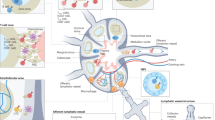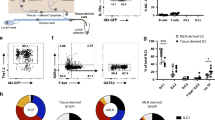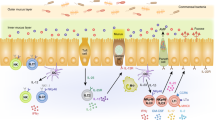Abstract
THE observation1 that the lymphoid blast cells in the thoracic duct lymph of rats homed preferentially to the lamina propria of the small gut after being injected intravenously has received ample confirmation2–4. But although the thoracic duct lymph of rodents comes principally from the intestine there must also be a significant contribution from other viscera as well as from the caudal somatic lymph nodes. It follows that the large lymphoid immuno-blasts present in thoracic duct lymph may have come from several sources, and it has been shown that their numbers increase after antigens have been injected subcutaneously into the hindquarters5. Are the immunoblasts that home to the small gut selected randomly, or do they have some special feature which mediates their extravasation in the gut? Straightforward immunological factors such as the specificity of the immunoblasts or the presence of antigens in the gut do not seem to be of primary importance6,7.
This is a preview of subscription content, access via your institution
Access options
Subscribe to this journal
Receive 51 print issues and online access
$199.00 per year
only $3.90 per issue
Buy this article
- Purchase on Springer Link
- Instant access to full article PDF
Prices may be subject to local taxes which are calculated during checkout
Similar content being viewed by others
References
Gowans, J. L., and Knight, E. J., Proc. R. Soc., B 159, 257–262 (1964).
Griscelli, C., Vassalli, P., and McCluskey, R. T., J. exp. Med., 130, 1427–1451 (1969).
Hall, J. G., and Smith, M. E., Nature, 226, 262–263 (1970).
Hall, J. G., Parry, D. M., and Smith, M. E., Cell Tissue Kinet., 5, 269–281 (1972).
Delorme, E. J., Hodgett, J., Hall, J. G., and Alexander, P., Proc. R. Soc., B 174, 229–236 (1969).
Halstead, T. E., and Hall, J. G., Tranplantation, 14, 339–346 (1972).
Moore, A. R., and Hall, J. G., Nature, 239, 161–162 (1972).
Guy-Grand, D., Griscelli, C., and Vassalli, P., Eur. J. Immun., 4, 435–443 (1974).
Lascelles, A. K., and Morris, B., Q. Jlexp. Physiol., 46, 199–206 (1961).
Hall, J. G., and Morris, B., Q. Jlexp. Physiol., 46, 360–369 (1962).
Hall, J. G., Q. Jlexp. Physiol, 52, 200–205 (1967).
Hall, J. G., and Morris, B., Q. Jlexp. Physiol., 48, 235–247 (1963).
Hall, J. G., Morris, B., Moreno, G. D., and Bessis, M. C., J. exp. Med., 125, 91–110 (1967).
Williams, A. F., and Gowans, J. L., J. exp. Med., 141, 335–345 (1975).
Vaerman, J. P., André, C., Bazin, H., and Heremans, J. F., Eur. J. Immun., 3, 580–584 (1973).
Author information
Authors and Affiliations
Rights and permissions
About this article
Cite this article
HOPKINS, J., HALL, J. Selective entry of immunoblasts into gut from intestinal lymph. Nature 259, 308–309 (1976). https://doi.org/10.1038/259308a0
Received:
Accepted:
Issue Date:
DOI: https://doi.org/10.1038/259308a0
This article is cited by
-
Collection of lymph-borne dendritic cells in the rat
Nature Protocols (2006)
-
Anti-tumor effects of the oral administration of the streptococcal preparation OK-432 (PICIBANIL) — the inhibition of carcinogenesis and growth in rats with ENNG-induced gastrointestinal tumors
The Japanese Journal of Surgery (1990)
-
Murine mesenteric and peripheral lymph nodes: a common pool of small T cells
Nature (1977)
-
Possible role of surface Ig in non-random recirculation of small lymphocytes
Nature (1976)
Comments
By submitting a comment you agree to abide by our Terms and Community Guidelines. If you find something abusive or that does not comply with our terms or guidelines please flag it as inappropriate.



